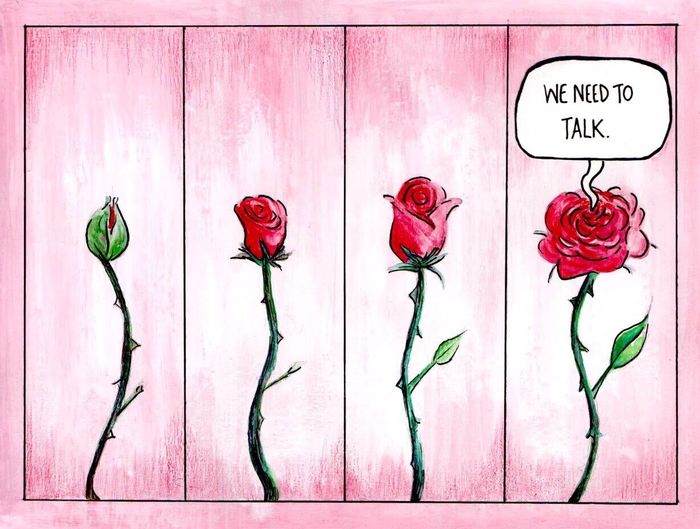Are Cambridge students romantically elitist?
Cadence Ware discusses academic sexism, maturing out of your hometown and why dating someone from the same university often feels like the best option

“Oh, so a smart girl, then”
I cannot tell you how many times I’ve received that message (or something like it) on Tinder. It seems harmless enough, and I’m well aware that there are far worse things that plague women on dating apps. Yet every time, I am instantly teleported back to my fifteen-year-old self, the one who was regarded only as a dictionary and a calculator, rather than as a friend or potential romantic interest. It reminds me of exclusion, of the fact that I felt as though others perceived my good grades as a barrier to viewing me as a complete person. Not to mention that the weirdly patronising juxtaposition of “smart” and “girl” makes me feel objectified, as though these strangers only see the “University of Cambridge” on my profile.
I don’t blame my secondary school friends for any of this. I don’t even really blame my Tinder matches. Rather, I blame a culture that states a woman can’t be both clever and desirable, something which has as much to do with the way in which we over-value academia as it does with lingering sexism. I don’t think it’s a divorcing of the categories of ‘clever’ and ‘attractive’ that’s to blame - a (highly scientific) Instagram poll I conducted revealed that 82% of people think the two can coexist. Yet the popularity of ‘Legally Blonde’, depicting an attractive woman’s struggle to be seen as smart, and the ubiquity of the trope of the bullied ‘nerdy’ girl, suggest that perhaps we are influenced by these unconscious stereotypes more than we might like to think. When I’m constantly having to justify myself with “haha it’s okay I’m not that smart” for fear of putting people off, I can’t help wondering whether it would be the same if I were a man. The days of women fighting for university degrees and being called “bluestockings” may be over, but it sometimes feels as though their legacy lingers on uncomfortably. Perhaps the tendency to date largely within the Cambridge student body is an attempt (successful or not) to break out of this pattern.
“To date someone from the place I’ve been trying to move on from since I was eighteen feels counterintuitive.”
There is, of course, a practical element to this as well. Many who now restrict themselves to students are, I expect, hardly going to exclusively date Oxbridge graduates later in life, but the complications of maintaining a long-distance relationship for half the year are made considerably easier when both of you are moving. And for some, Cambridge really is home. I am one of the lucky ones who, when lockdown started and we were told to “go home”, had somewhere safe and relatively stable to return to. But I never felt as though I was going home. The university, in the midst of this crisis, has perhaps forgotten that, for many students, Cambridge is home, even if they may have somewhere else that they can go. Is it any wonder, then, that I and many others don’t want to start relationships outside Cambridge? To date someone from the place I’ve been trying to move on from since I was eighteen feels counterintuitive.
It’s easy to assume that the “Cambridge swiping bubble” must be founded in an inherent elitism. Yet, while I believe it does say something about us as a student body, that doesn’t mean that everyone expects their date to have been to Westminster or want to discuss only ‘highbrow’ subjects during Netflix and chill. Sure, those people exist. I tend to avoid them like I avoid people who mansplain, are rude to waiters or talk trash about their ex. But for most of us, perhaps the reverse is the case: that, paradoxically, dating other Cambridge students means that those parts of our personalities that have nothing to do with university are able to reveal themselves. Moving suddenly from an environment in which you are “the smart one” to one where your academic ability is no better than anyone else’s can lead to feelings of imposter syndrome. However, it can also, more positively, allow you to be seen as something more than just a walking brain, since your academic ability is no longer your sole exceptional feature.
Having said all this, perhaps it’s all merely another example of how much we all labour under false illusions, romanticising Cambridge as the place where we are destined to meet the love of our lives. After all, it’s not as though the pace of term really allows much to happen. But there are valid reasons for wanting, at least for now, to date someone who ‘gets’ the grind of weekly essays, who will see us as someone other than the “smart girl”. There is time enough to find someone else when Cambridge ejects us all at the other end. Perhaps we’ll only realise how awful the Cambridge dating scene is when we leave it.
 Interviews / Lord Leggatt on becoming a Supreme Court Justice21 January 2026
Interviews / Lord Leggatt on becoming a Supreme Court Justice21 January 2026 Features / Are you more yourself at Cambridge or away from it? 27 January 2026
Features / Are you more yourself at Cambridge or away from it? 27 January 2026 News / Reform candidate retracts claim of being Cambridge alum 26 January 2026
News / Reform candidate retracts claim of being Cambridge alum 26 January 2026 News / Report suggests Cambridge the hardest place to get a first in the country23 January 2026
News / Report suggests Cambridge the hardest place to get a first in the country23 January 2026 News / Cambridge psychologist to co-lead study on the impact of social media on adolescent mental health26 January 2026
News / Cambridge psychologist to co-lead study on the impact of social media on adolescent mental health26 January 2026










